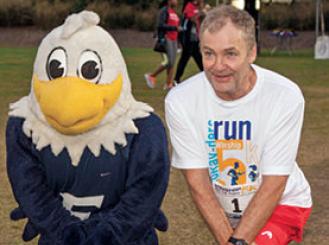Feb 25, 2015
Executive Director of the Winship Cancer Institute of Emory University and NRG Oncology Group Chairman; ASCO Board of Directors Member; Finance Committee Member
AC: What led you to oncology?
Dr. Curran: Early in medical school I knew I would become an oncologist. The only question was in what subspecialty. After being locked out of a medical student elective in pediatric oncology at Boston Children’s Hospital, I found an open slot in a radiation oncology elective at the former Joint Center for Radiation Therapy in Boston. After an amazing experience in that program, I chose to train in radiation oncology and never looked back.
AC: What’s the last book you read?
Dr. Curran: In part because I love to read, but don’t always make the time to read, I recently joined a neighborhood men’s book club. Our last book was East of Eden. I loved the passion of my neighbors grappling with this epic novel.
AC: What hobbies do you enjoy?
Dr. Curran: Most of my “hobby” time is spent around family and/or sports activities, like running, basketball, youth sports coaching, and other crazy fitness activities. I have run more than 50,000 miles during my lifetime for no particular reason, and I get slower every year. The photo here is of me and the Emory mascot Swoop at the 2014 Winship Cancer Institute 5K. Swoop beat me. I still coach and play basketball with my sons and other youngsters, and this has become both more futile and more fun each year.
AC: Do you have a personal motto?
Dr. Curran: “Expect the Unexpected.” This corny motto prepares me for being unprepared. It allows for more creative thinking about the scenarios we will or will not face in our personal and professional lives. As caregivers of patients with cancer, we are reminded every day about the fragility of life and the futility of planning a linear professional or personal path. I try, with variable success, to apply this wisdom to other realms in my life.
AC: What is your fondest memory?
Dr. Curran: My fondest professional memories center on two types of success: Those of my patients and those of my colleagues I have helped mentor. Like many readers, I have had many patients living well and living far beyond reasonable expectations. I also have colleagues achieving success in unpredictably positive ways.
AC: Who is the person you most admire?
Dr. Curran: My parents. They raised my sisters and me with an intuitive mix of love, support, and toughness. I gained an irreverent approach to the world from my mother and a calm and pragmatic idealism from my father.
AC: What career could you see yourself in if you weren’t an oncologist?
Dr. Curran: I had a five-year career as a middle school teacher and coach before medical school and loved every moment of it. Perhaps I will return to this for another stint!
AC: What changes do you envision for the field in the next 10 years?
Dr. Curran: I expect that oncology practice will change more in the next 10 years than it did in the last 30. Our patients will have access to diagnostic and therapeutic tools that were unthinkable when we were in training. These transformative changes will require attentive stewardship by physician leaders.
AC: What would you say to a young physician thinking about entering the field of oncology?
Dr. Curran: A) Listen to and learn from your patients. B) Give thanks every day for having such extraordinary expertise and skill to serve people in need. C) Don’t let the politics keep you from cherishing and enjoying your personal and professional lives.

